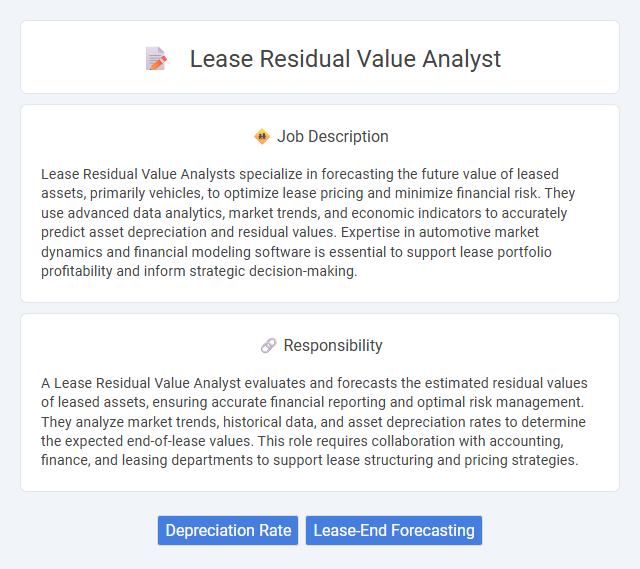
Lease Residual Value Analysts specialize in forecasting the future value of leased assets, primarily vehicles, to optimize lease pricing and minimize financial risk. They use advanced data analytics, market trends, and economic indicators to accurately predict asset depreciation and residual values. Expertise in automotive market dynamics and financial modeling software is essential to support lease portfolio profitability and inform strategic decision-making.
Individuals with strong analytical skills and attention to detail are likely to be well-suited for a Lease Residual Value Analyst role, as the job requires evaluating vehicle depreciation trends and market data accurately. Those comfortable working with numbers and forecasting financial outcomes may find this position aligns with their strengths and interests. Candidates lacking quantitative aptitude or unfamiliar with financial modeling might struggle to meet the job's demands effectively.
Qualification
A Lease Residual Value Analyst requires strong analytical skills, proficiency in financial modeling, and expertise in market trends related to vehicle depreciation. Candidates typically hold a degree in finance, economics, or a related field and possess experience with lease accounting standards and data analysis software. Deep understanding of residual value forecasting and risk assessment is essential for accuracy in lease portfolio valuation.
Responsibility
A Lease Residual Value Analyst evaluates and forecasts the estimated residual values of leased assets, ensuring accurate financial reporting and optimal risk management. They analyze market trends, historical data, and asset depreciation rates to determine the expected end-of-lease values. This role requires collaboration with accounting, finance, and leasing departments to support lease structuring and pricing strategies.
Benefit
Lease Residual Value Analysts likely play a critical role in assessing and projecting the end value of leased assets, which can improve financial forecasting and risk management for companies. Their expertise might contribute to optimizing lease terms and enhancing profitability through more accurate residual value estimates. This position may also offer career growth opportunities in finance and asset management sectors.
Challenge
Lease Residual Value Analysts may encounter challenges in accurately predicting asset depreciation due to fluctuating market conditions and evolving consumer preferences. Balancing historical data with emerging trends could require advanced analytical skills and adaptability. Effective risk assessment might rely heavily on precise forecasting to optimize lease terms and minimize financial exposure.
Career Advancement
A Lease Residual Value Analyst plays a critical role in evaluating and forecasting vehicle residual values to support leasing decisions and minimize financial risk. Mastery of data analysis, market trends, and financial modeling can lead to advancement opportunities into senior analyst roles or managerial positions within automotive finance and leasing companies. Developing expertise in predictive analytics and industry regulations enhances career growth potential in this specialized field.
Key Terms
Depreciation Rate
A Lease Residual Value Analyst specializes in forecasting the depreciation rate of leased assets, primarily vehicles, to determine accurate residual values at lease maturity. Accurate assessment of depreciation rates directly impacts lease pricing, risk management, and profitability for financial institutions and leasing companies. Proficiency in data analysis, market trend evaluation, and statistical modeling is essential for optimizing residual value predictions and minimizing financial losses.
Lease-End Forecasting
A Lease Residual Value Analyst specializing in Lease-End Forecasting evaluates projected vehicle values at lease termination to optimize financial outcomes. Utilizing advanced data analytics, market trends, and depreciation models, the analyst ensures accurate residual valuations that support lease pricing and risk management strategies. Expertise in lease-end market conditions enables precise forecasting to minimize losses and maximize asset recovery.
 kuljobs.com
kuljobs.com